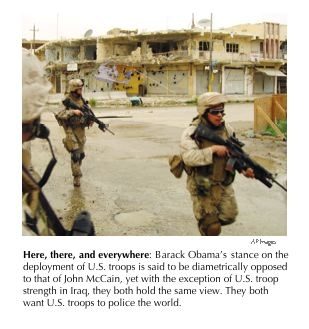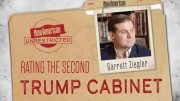
Every four years, the American presidential electoral burlesque gets underway with a flock of candidates vying to be anointed the Democratic or Republican standard-bearer, all the way to the Oval Office. Every one of those candidates promises change. Yet by the time the primary dust clears, the two candidates left standing seldom exhibit more than cosmetic differences in policy, either between themselves or in contrast to any president or major-party presidential nominee within living memory.
Since the Great Depression, the American presidential race has almost always featured two major candidates with, to use former presidential candidate George Wallace’s pungent terminology, “not a dime’s worth of difference” between them. In particular, in matters of foreign policy, finance, and federal subsidies of every stripe — the three activities of the federal government that determine our political and economic destiny — no president or major-party presidential nominee since Calvin Coolidge, except Barry Goldwater, has strayed outside strictly observed lines of orthodoxy. The occasional candidate willing to challenge this bipartisan orthodoxy, and who manages to attract enough of a following to launch a viable campaign — a Congressman Ron Paul or a Pat Buchanan, or in a former generation, a Senator Robert Taft — always finds himself vilified and attacked by the so-called mainstream media and assailed by leadership within his own party.
This electoral cycle is proving no different. A crowded field of presidential aspirants that included, on the Republican side, the principled Tom Tancredo and the impeccable libertarian constitutionalist Ron Paul, and on the Democratic, strident anti-establishment types like Dennis Kucinich and Mike Gravel, has been winnowed down to two polished posers who offer the American public, yet again, not a choice but an echo.
Similar Script
As with presidential tilts past, this one promises to be long on tawdry melodrama but short on substance. Obama’s skin color or bowling ability have nothing to do with his performance in office, any more than McCain’s alleged bad temper is a reliable indicator of his willingness to uphold the U.S. Constitution if elected. In fact, aside from age, race, and rhetorical style, Obama and McCain are remarkably similar in almost every area where their views really matter, despite the perception that one is a candidate of change and the other a candidate of the status quo.
For example, neither candidate has uttered a peep against the United Nations or against the general internationalist cant of American foreign policy. Obama is widely viewed as the candidate more likely to extricate U.S. forces from Iraq, but he has made unmistakably clear, in his pledge to defend Israel and his tough talk on Iran, that he regards U.S. foreign aid and military involvement in the Middle East in some form as non-negotiable. As for American troops still deployed in around 130 countries, presumptive candidate Obama has given no indication he would consider bringing them home.
Presumptive candidate McCain’s support of the Iraq War and other acts of U.S. military interventionism are well known. Council on Foreign Relations Director of Studies Gary Samore recently described McCain as an “interesting mix of neoconservative, for lack of a better term, and traditional, middle-of-the road internationalist.” He went on to note that U.S. military interventionism is a matter of bipartisan consensus: “There has been an element in American foreign policy, which has been expressed in both liberal Democratic administrations and conservative Republican administrations, for making the world in our image. That’s American. It’s just that the latest manifestation has been by a conservative Republican administration [i.e., the Bush presidency].”
On issues related to the economy, both candidates follow a similar script. John McCain, the alleged conservative, proposes on his website to cut a wide range of taxes (especially on behalf of the middle class) and to reduce burdensome giveaways like the ethanol subsidy. Conveniently unspecified “broken” government programs are to be shut down. Social Security and Medicare, however, are not to be phased out but reformed along with federal unemployment benefits and subsidized home and student loans. His much-publicized hostility to budgetary earmarks is selective, to say the least; a McCain presidency certainly has no intention of challenging the overall premise of welfarism.
In international trade, McCain supports “multilateral, regional and bilateral efforts to reduce barriers to trade, level[ing] the global playing field and build[ing] effective enforcement of global trading rules” — that is to say, continual participation in pet internationalist projects like NAFTA and the World Trade Organization designed to hijack our sovereign decision-making authority over trade.
Tellingly, the McCain plan makes no mention whatsoever of dealing with the real culprit for the ongoing economic crisis, the noxious Federal Reserve System that has destroyed the worth of the dollar over decades of inflationary activity.
As for Barack Obama, the presumptive Democratic candidate, like his rival, favors cutting taxes for the middle class, reforming NAFTA and strengthening the World Trade Organization, and retooling the federal government’s role in the mortgage industry. He also supports raising the minimum wage, giving new vigor to labor unions, and investing in technology R&D, among many other things. Like McCain, Obama makes no mention of the Federal Reserve and targets no specific federal programs for elimination.
On another prominent issue, the environment, both candidates are pledging to fight the supposed scourge of man-made global warming. Candidate Obama intends to use the power of the federal government, via a so-called “market-based cap-and-trade system,” to force American industry to reduce greenhouse gas emissions by 80 percent by the year 2050. Candidate McCain, by trivial contrast, proposes to use a market-based cap-and-trade system to compel industry to reduce carbon emissions by 60 percent by the year 2050.
The American Establishment
How does the modern American two-party political system so successfully exclude presidential candidates with genuinely contrasting programs, or with views sympathetic to limited, constitutional government? The answer lies in the way that the system has come under the control of a cadre of powerful elites, who have learned to control access to the Republican and Democratic presidential nominating process and to set the terms of political debate by manipulating public opinion.
“The argument that the two parties should represent opposed ideals and policies, one, perhaps, of the Right and the other of the Left, is a foolish idea acceptable only to the doctrinaire and academic thinkers,” wrote Georgetown University history professor Carroll Quigley, describing modern American political parties in his magnum opus Tragedy and Hope. “Instead, the two parties should be almost identical, so that the American people can ‘throw the rascals out’ at any election without leading to any profound or extreme shifts in policy.” According to Quigley, who expended an extraordinary amount of ink detailing the rise of the modern international financial and political establishment (an “international network” whose secret records Quigley had been permitted to examine, but that “wished to remain unknown,” as the Georgetown historian characterized it), “the chief problem of American political life for a long time has been how to make the two … parties more national and international.” Bipartisan agreement on essential features of foreign policy, economics, and social engineering is a must, Quigley insisted:
The policies that are vital and necessary for America are no longer subjects of significant disagreement, but are disputable only in details of procedure, priority, or method: we must remain strong, continue to function as a great world Power in cooperation with other Powers, avoid high-level war, keep the economy moving without significant slump, help other countries do the same, provide the basic social necessities for all our citizens, open up opportunities for social shifts for those willing to work to achieve them, and defend the basic Western outlook of diversity, pluralism, cooperation, and the rest of it, as already described. These things any national American party hoping to win a presidential election must accept. But either party in office becomes in time corrupt, tired, unenterprising, and vigorless. Then it should be possible to replace it, every four years if necessary, by the other party, which will be none of these things but will still pursue, with new vigor, approximately the same basic policies.
Quigley’s language is vague, perhaps purposely so, but we can fill in a few of the blanks. “Function[ing] as a great world Power in cooperation with other Powers” means, among other things, maintaining American membership in the United Nations and other international organizations. “Keeping the economy moving” means using all manner of government interference to “stimulate” the economy, including manipulation of the money supply by the Federal Reserve. “Help[ing] other countries do the same” is code for foreign aid as well as international financial collusion. “Provid[ing] the basic social necessities for all our citizens” is an open-ended reference to a range of welfarist sacred cows, quite likely ranging from agricultural subsidies to unemployment benefits to Social Security. Such policies outlined by Quigley (and borne out by the historical record, as we shall see) are calculated to ensure control by a few elites over the nation’s finances and international relations, and to fundamentally alter our entire system of government, jettisoning constitutional federalism in favor of oligarchical socialism.
Accordingly, major presidential candidates for several generations have been permitted to propose varying degrees and differing allocations of foreign aid — but not to challenge the constitutionality of foreign aid in the first place. Our degree of participation in United Nations programs and UN-affiliated treaties like the Law of the Sea and the Kyoto Accord may be questioned, but not membership in the international body. Subsidies for agriculture, industry, education, welfare recipients, the arts, housing, and a wealth of other sectors, may be raised or lowered, but never abolished. Whether the Federal Reserve, together with the Treasury Department, chooses to pursue “tight” or “loose” monetary policy is fodder for debate; abolition of the entire Federal Reserve System is not. America has been saddled with a Federal Reserve System since 1913, with agricultural subsidies and Social Security since the Great Depression, with membership in the United Nations since the end of World War II, and with massive annual outflows of foreign aid since the post-World War II Marshall Plan, yet not once has any U.S. president questioned the viability of such programs.
Quigley’s “network” of elites — in government, finance, business, the news media, and the academy — has managed to thwart since World War II nearly every attempt by a genuine conservative or constitutionalist to crash the presidential electoral party. In 1940, 1948, and 1952, conservative Ohio Senator Robert Taft (known as “Mr. Republican”) tried repeatedly to secure the GOP presidential nomination and, in spite of running three strong campaigns, was stymied thrice, in each case by a “mainstream” establishment-approved candidate.
The GOP primary race between Taft and Dwight D. Eisenhower in 1952 was a particularly close and bitterly contested affair that lasted right up to the convention. Once the convention opened, the Eisenhower camp, unsure of its chances of winning fair and square, persuaded the convention to replace pro-Taft delegates from a number of states with pro-Eisenhower delegates, alleging that the Taft camp had unfairly stolen them (echoes of more recent treatment of Ron Paul supporters in several state conventions). In spite of the Taft camp’s angry denials, the convention voted in favor of this so-called “Fair Play” proposal, and Eisenhower, by convention-floor sleight of hand, wrested the nomination from Robert Taft.
Only once in modern times has a candidate in violation of establishment orthodoxy secured the presidential nomination. In 1964, Senator Barry Goldwater, a conservative who did not fit the establishment mold, managed to get the GOP presidential nomination. Comments Quigley, “The capture of the Republican National Party by the extremist elements of the Republican Congressional Party in 1964, and their effort to elect Barry Goldwater to the Presidency with the petty-bourgeois extremists [note the Marxist terminology] alone, was only a temporary aberration on the American political scene.” Indeed, Goldwater soon found not only the Democratic Party but the leadership of his own party working against him. Nelson Rockefeller, a New York governor and leader of the liberal establishment wing of the GOP, helped to sabotage Goldwater’s campaign. The Arizona Senator was smeared as a war-monger, and an infamous anti-Goldwater campaign commercial showed a small child picking a daisy right before an atomic bomb detonated. The implication was that the fiery Goldwater would start a nuclear war, and it helped sink the GOP standard-bearer’s campaign. Barry Goldwater lost the 1964 election to Lyndon Johnson, another big-government liberal who plunged America into the Vietnam War and whose Great Society welfare program of the sixties was surpassed only by the New Deal in scope and cost.
Since the Goldwater campaign, America’s ruling establishment has successfully denied non-housetrained candidates a realistic shot at the presidency. Ronald Reagan talked a good talk, but his pick of arch-insider George Bush as his veep signaled his intention not to rock the boat. As president, Reagan continued to give lip service to limited government, but supported business as usual — bigger government, more favors to special interests, refusal to abolish programs he campaigned against — with his signing pen.
To forestall the risk of a Goldwater ever again coming within an election of the presidency, genuine would-be agents of change — the occasional Ron Paul or Pat Buchanan who manages to stir the fancy of the GOP’s conservative base — are ruthlessly kneecapped in the primaries. The establishment elites usually accomplish this by persuading voters that the candidate in question, whatever his virtues, cannot win, and a ballot cast for him is a wasted vote. This technique was used against Taft in 1952, and has more recently been deployed against Ron Paul. To the degree that the American public allows itself to be lulled by such propaganda, the “can’t win” pronouncement becomes a self-fulfilling prophecy.
CFR Influence
The American establishment, far from being a vague, loosely knit entity, is represented by a number of front organizations in the United States, of which the New York City-based Council on Foreign Relations (CFR) is by far the most prominent.
The importance of the CFR is difficult to overstate. Since its founding in 1921, the CFR has included in its membership many of America’s most influential men and women in government, finance, industry, the media, and the academy. CFR founder Edward Mandell (“Colonel”) House, for example, was President Woodrow Wilson’s closest adviser and the chief architect of the League of Nations. John Foster Dulles, another original CFR member, was one of America’s most important 20th-century foreign-policy architects. Yet another CFR co-founder, journalist Walter Lippmann, founded the influential political journal The New Republic and, as evidenced in his book Public Opinion, was among the first to promote the idea of major news networks controlled by America’s elites to manipulate public opinion in favor of big government (“manufacturing consent,” Lippmann termed it). The goals of the CFR’s founders were to create conditions in finance, in politics, and in public opinion under which the American system of limited government — a system Lippmann, House, and the others were dissatisfied with — could be fundamentally changed, and a new international order based on a truly global system of governance would eventually be accepted.
Over the decades, CFR membership has grown to more than 4,000. CFR members have dominated every administration since Eisenhower, who was himself a member. Presidents Herbert Hoover, Richard Nixon, Gerald Ford, Jimmy Carter, George H. Bush, and Bill Clinton were all CFR members; so were vice presidents Hubert Humphrey and Walter Mondale. Every Secretary of State between Dean Acheson in 1953 and the present Condoleezza Rice except James Baker were CFR members; so was every Secretary of Defense from Eisenhower’s Neil H. McElroy through the present Michael Gates except Lyndon Johnson’s Clark Clifford (but Johnson’s other Secretary of Defense, Robert McNamara, was) and Donald Rumsfeld (who was a CFR member prior to joining the Bush administration).
Every Federal Reserve chairman since Marriner Eccles under Truman has been a CFR member. Numerous prominent members of Congress and of the so-called “mainstream news media” are also CFR veterans. Truly, as Washington Post ombudsman Richard Harwood admitted in 1993, the Council on Foreign Relations is “the nearest thing we have to a ruling establishment in the United States.” The CFR is not, Harwood added, “a retinue of people who ‘look like America,’ as [President Bill Clinton] once put it, but they very definitely look like the people who, for more than a century, have managed our international affairs and our military-industrial complex.”
And what was true back in 1993 is even more the case now. The latest version of the American establishment’s quadrennial dog-and-pony show is underway, with two not-so-different presidential candidates backed by some wearily familiar faces.
Zbigniew Brzezinski, for example, a veteran CFR member who was Jimmy Carter’s national security adviser, has signed on as a foreign-policy adviser for Barack Obama (after serving presidential aspirant John McCain in the 2000 campaign in a similar capacity!). George Soros, the flamboyant billionaire hedge-fund manager and left-wing agitator — and also a CFR member — is another prominent Obama adviser. Of the 13 members of Obama’s Senior Working Group on National Security, eight (Madeleine Albright, David Boren, Warren Christopher, Lee Hamilton, Sam Nunn, William Perry, Susan Rice, and James Steinberg) are CFR members and one (Anthony Lake) is a former member. Former Senate Majority Leader Thomas Daschle, yet another prominent Obama adviser, is CFR; so is Penny Pritzker, Obama’s national finance chair. Obama’s economic advisers include CFR members Daniel Tarullo and Michael Froman.
In the McCain camp, the picture is little different. McCain’s advisers on foreign policy and national security include Robert Kagan, Henry Kissinger, Peter Rodman, James Woolsey, Richard Williamson, and Stephen E. Biegun, some of whom are household names, and all of whom belong to the Council on Foreign Relations. Among McCain’s economic advisers are numbered Peter G. Peterson, a former CFR chairman, as well as Gerald Parsky, Douglas Holtz-Eakin, Kenneth Rogoff, Joseph Wright, and Anne Krueger, CFR members all.
As for the mainstream news media in charge of conditioning the American public for yet another presidential Hobson’s choice, expect the likes of Katie Couric, Brian Williams, and Barbara Walters (all CFR members) not to rock the boat.
Stylistic differences aside, an Obama or a McCain presidency would differ little. We may expect that, thanks to the stranglehold of the American establishment on the presidency, either man would — as their predecessors have done for several generations — continue to advance the internationalist/socialist agenda of their puppet masters and predecessors. Informed voters must understand that, until the CFR-centered establishment’s control over the executive branch is broken, genuine reforms restoring constitutional limitations on the power of the federal government will not be forthcoming from any American president. Other portions of the federal government less under the control of establishment insiders — the House of Representatives, most prominently — are still susceptible to genuine reform.



